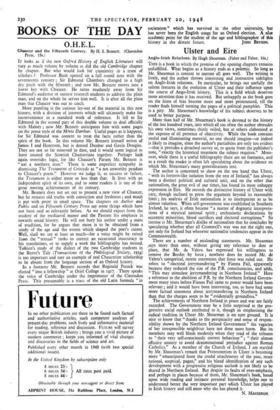Ulster and Eire
Anglo-Irish Relations. By Hugh Shearman. (Faber and Faber. 16s.)
THIS is a book in which the promise of the opening chapters remains unfulfilled.. What begins as a history ends as a polemic. So long as Mr. Shearman is content to narrate all goes well. The writing is lively, and the author throws interesting and instructive sidelights on Anglo-Irish relations. In particular, he brings out usefully the salient features in the evolution of Ulster and their influence upon the course of Ango-Irish history. This is a field which deserves more attention than it has received. But unhappily as the book goes on the hints of bias become more and more pronounced, till the reader finds himself turning the pages of a political pamphlet. This is a pity. Mr. Shearman's knowledge of his subject deserves to be used to better purpose.
More than half of Mr. Shearman's book is devoted to the history of the last hundred years, into which all too often the author obtrudes his own views, sometimes thinly veiled, but at others elaborated at the expense of all pretence of objectivity. While the book contains useful and illuminating material, no one should imagine—or indeed is likely to imagine, since the author's partialities are only too evident —that it provides a detached survey or, to quote from the publisher's note, " exactly the historical treatment the subject requires." More- over, while there is a useful bibliography there are no footnotes, and as a result the reader is often left speculating about the evidence on which Mr. Shearman's many generalisations rest.
The author is concerned to show on the one hand that Ulster, " with its fortress-like isolation from the rest of Ireland," has always been a distinct political and cultural unit, and on the other that nationalism, the great evil of our times, has found its most unhappy expression in Eire. He records the distinctive history of Ulster with care, though inclined to press the argument beyond its reasonable limit ; his analysis of Irish nationalism is so intemperate as to be almost valueless. When self-government was established in Southern Ireland, he says, it often became " a matter of dogmatic interpreta- tions of a mystical national spirit ; enthusiastic declarations by eccentric minorities, blood sacrifices and electoral corruptions." So intense is Mr. Shearman's dislike of nationalism that he concludes by speculating whether after all Cromwell's way was not the right one, not only for Ireland but wherever nationalist tendencies appear in the Commonwealth.
There are a number of misleading statements. Mr. Shearman ,says more than once, without giving any reference to date or place, that Mr. de Valera has expressed his willingness to remove the Border by force ; nowhere does he record Mr. de Valera's categorical, recent statements that force was ruled out. He refers to "electoral jerrymandering" by Fianna Fail, apparently because they reduced the size of the P.R. constituencies, and adds, " This may stimulate jerrymandering in Northern Ireland." Here a reference to the abolition of P.R. by the Northern Ireland Govern- ment many years before Fianna Fail came to power would have been relevant ; and it would have been interesting, too, to have had some more factual statement about jerrymandering in Northern Ireland than that the charges seem to be "evidentially groundless."
The achievements of Northern Ireland in peace and war are fairly recorded. The Government may be a little surprised at the pro- gressive social outlook attributed to it, though in emphasising the • radical tradition in Ulster Mr. Shearman is on sure ground. It is nice to know that " thanks to the perspicacity and sense of respon- sibility shown by -the Northern Ireland Government " the vagaries of her irresponsible neighbour have not done more harm. But- its members may well blush modes4 when they read of the tributes to " their very self-consciously correct behaviour " ; " their almost effusive anxiety to avoid denominational prejudice against Roman Catholics." As a member of the Church of Ireland, I am startled by Mr. Shearman's remark that Protestantism in Ulster is becoming more " emancipated from the credal attachments of the past, more rational, sceptical, pagan," and his bland identification of any such development with a progressive religious outlook is not likely to be shared in Northern Ireland. But despite its faults of over-emphasis, and perhaps in places because of them, Mr. Shearman's book, based upon wide reading and intimate personal knowledge, helps one to understand better the very important part which Ulster has played in Irish history and still more why she has played it.
N. MANSERG1L






























 Previous page
Previous page